This is a written version of a talk I gave on September 21, 2013, at the XOXO conference in Portland.
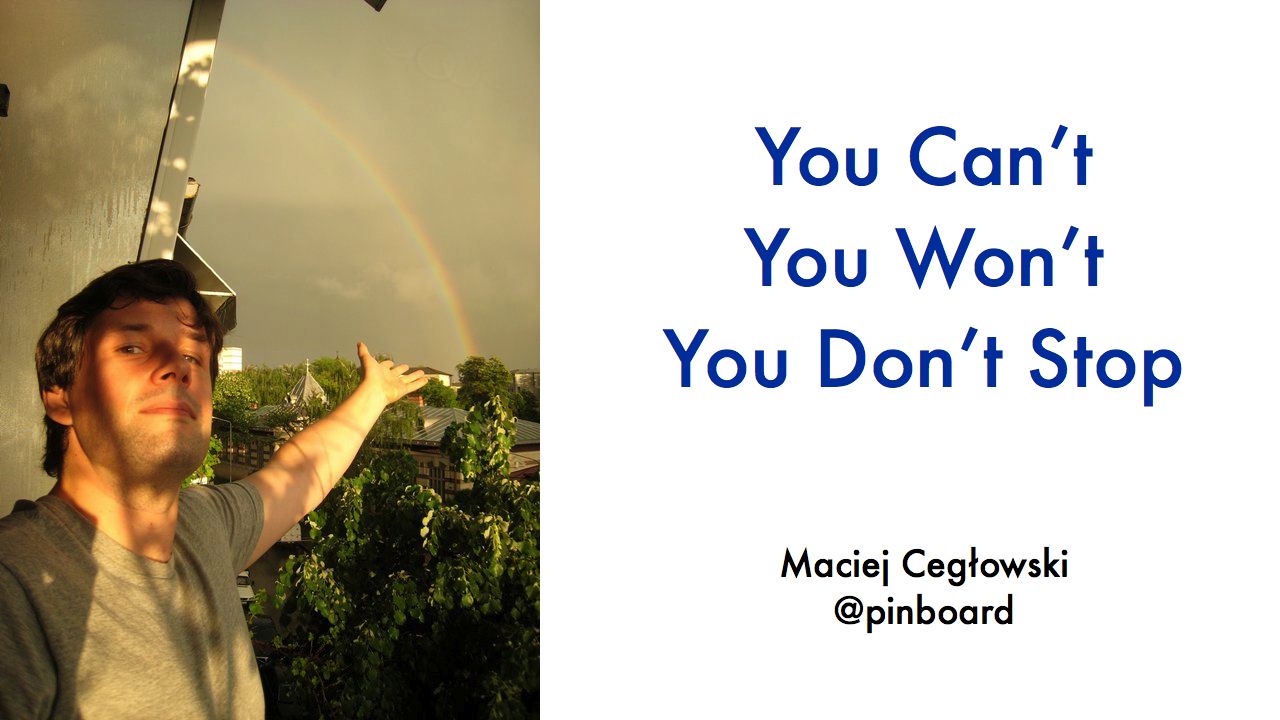 |
This is a picture of me in 2009, right around when I started Pinboard. I'm standing on a balcony in Botosani county, Romania, in the poorest county in the European Union. I'm smiling in this photo, but in reality I was having a rough time. I was $50k in debt, didn't have a job, and the contract work I depended on for my living was drying up because the world economy had just exploded. And to top it off, the Russians were mad at Romania and had turned off the natural gas pipeline. I didn't realize it at the time, but this rainbow was the real deal. Pinboard took off much faster than I expected, and I was quickly able to make it my full-time job. Next month will mark four years since the last time I worked for anyone but myself. This was a dream come true for me, and lately I've been giving more and more thought about how to keep the party going. Bookmarking sites seem to have a life expectancy of four years, but I don't want to stop! I want to keep doing this for years. So in this kind of reflective spirit, I went back and re-read a book that had a profound effect on me when I was younger, that really lit a fire under me about being self-reliant and living a life on my own terms. I wanted to see if it still had anything to say to me now that I was actually doing it. And to my relief, it was even better than I remembered. It turns out there was all kinds of stuff I had missed because I was too young, or too callow, to really understand it. |
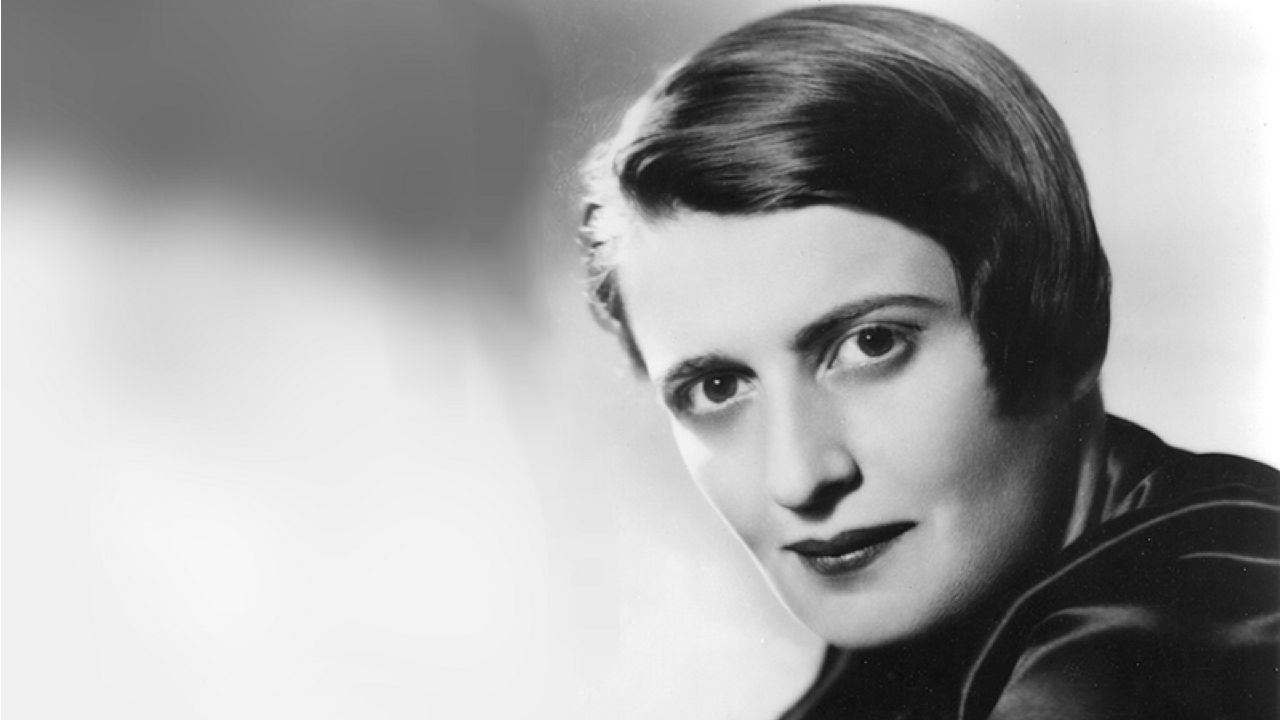 |
[at this point I troll the audience by displaying a huge slide of Ayn Rand] So today I want to talk to you about one of my biggest heroes, whose work I think will have a profound impact on anyone trying to create something on their own terms. |
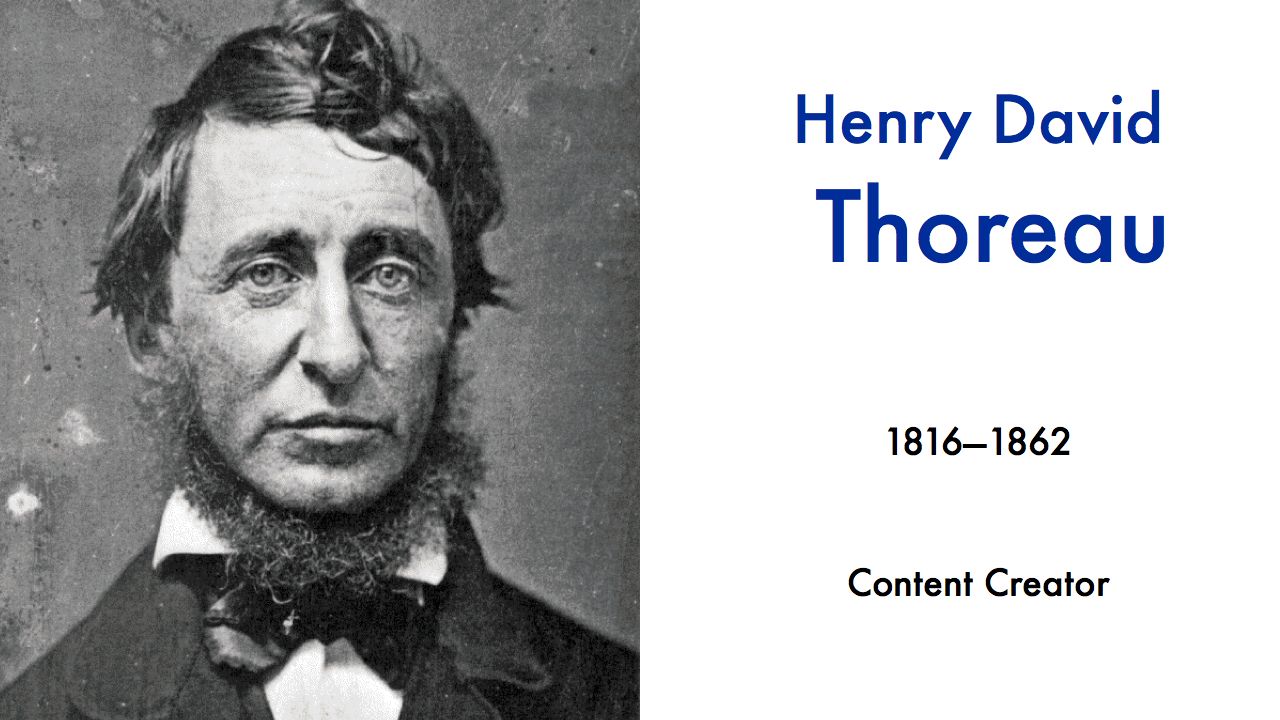 |
Of course I mean this guy, Henry David Thoreau. For those of you who weren't forced to read him in high school, he was a content creator active in the 1850's, a pal of Emerson's, active in the Transcendentalist movement. We mainly remember him for an experiment in minimal living he conducted at Walden Pond. In 1845, he built himself a small cabin, moved in, and spent two years living and writing about the experience. You'll notice he's got a neckbeard going. Louisa May Alcott said of this neckbeard, It will most assuredly deflect amorous advances and preserve the man’s virtue in perpetuity And she wasn't wrong. But discovering the contraceptive properties of the neckbeard was not the only thing that put Thoreau ahead of his time. The man was a pescatarian, a locavore, probably the first environmentalist, a do-it-yourselfer. He practiced yoga, read Hindu sacred texts, and was a bit of a food faddist. He would frequently walk around in camouflage, since that made it easier to sneak up on wild animals. In short, he's the kind of guy who would fit right in in Portland. |
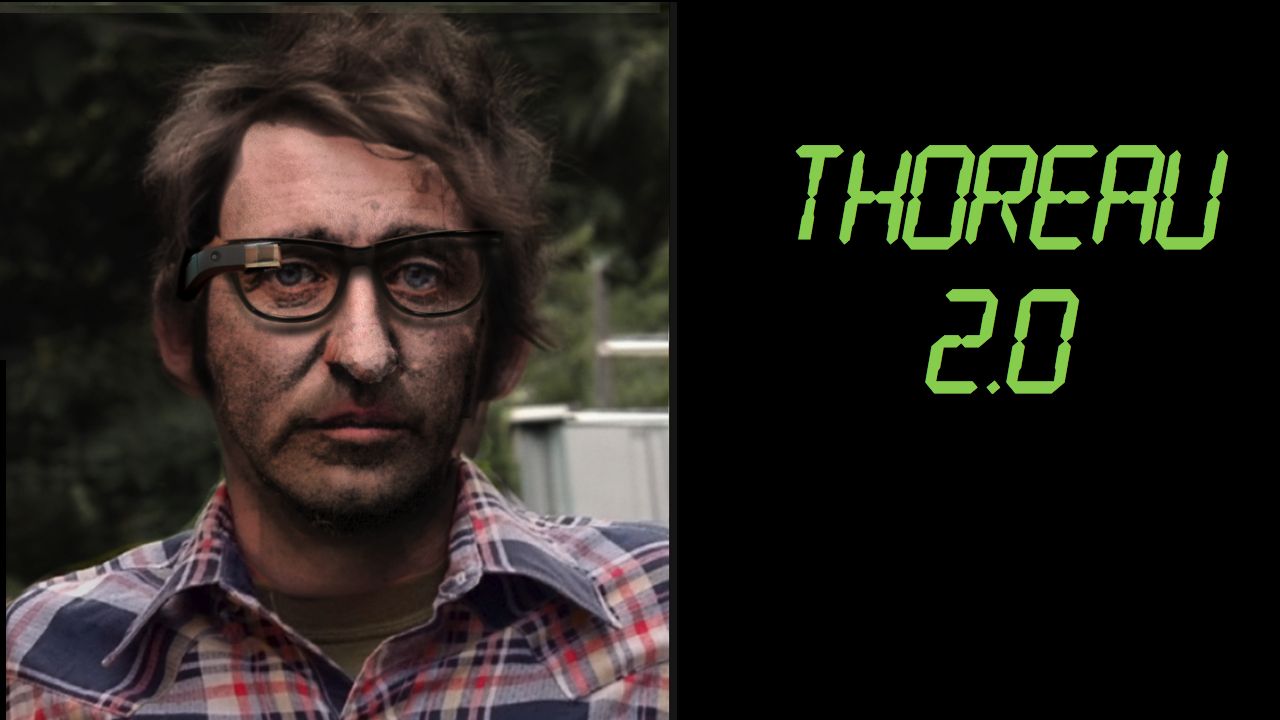 |
So today I want to rebrand Thoreau for the Internet crowd. I wish to present to you Thoreau 2.0. |
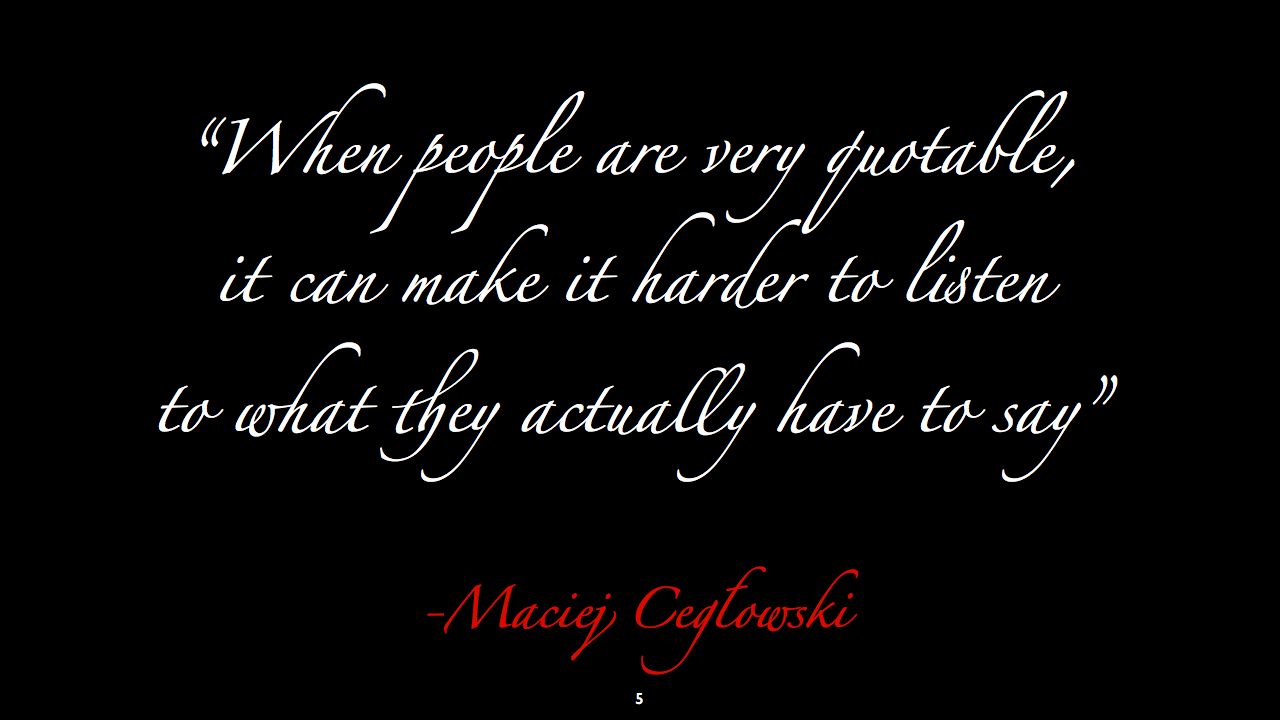 |
First, though, a word of warning. Thoreau is a wonderful writer and often extremely quotable. But when people are very quotable, it can make it harder to listen to what they actually have to say. Walden is a layered work. You can't just go in and strip-mine it for a bunch of Tim Ferriss-style life hacks, or inspirational quotes, without missing the entire point of the book. Since we have limited time, though, I've gone and picked out some Tim Ferriss-style lifehacks and inspirational quotes, which I will present as a set of bullet points. |
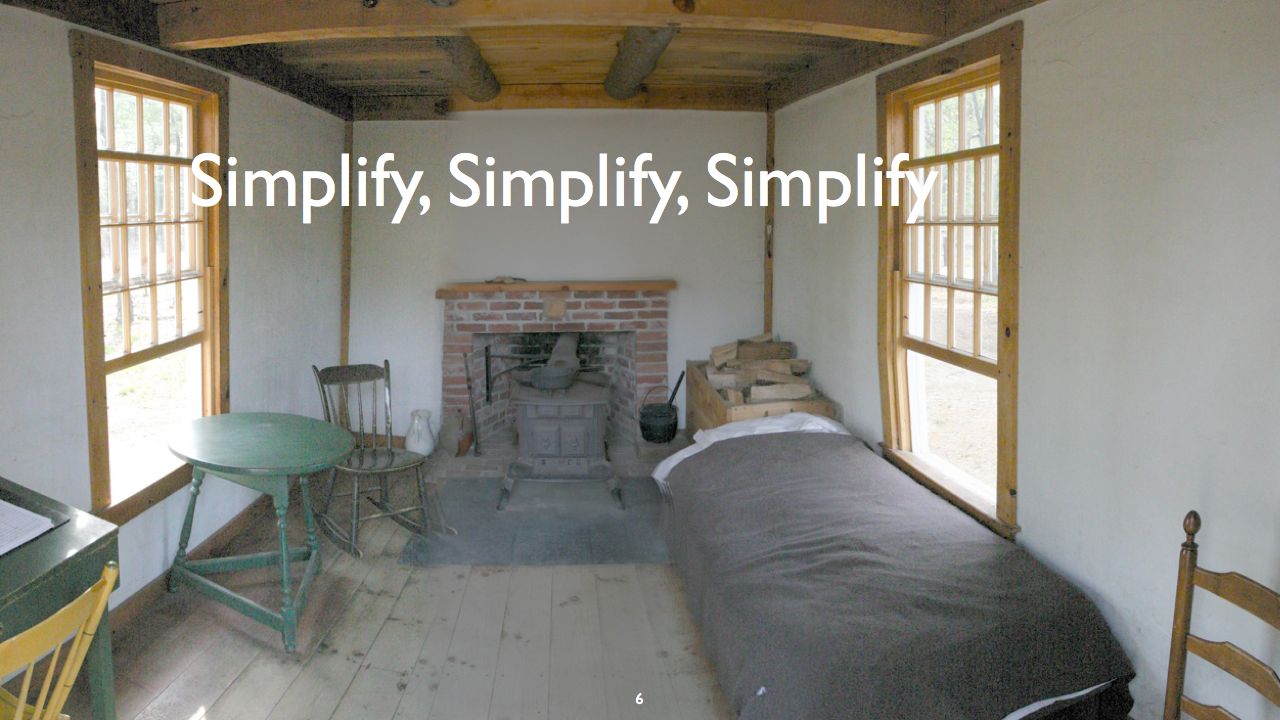 |
This is probably Thoreau's most famous quote, “Simplify, Simplify, Simplify” |
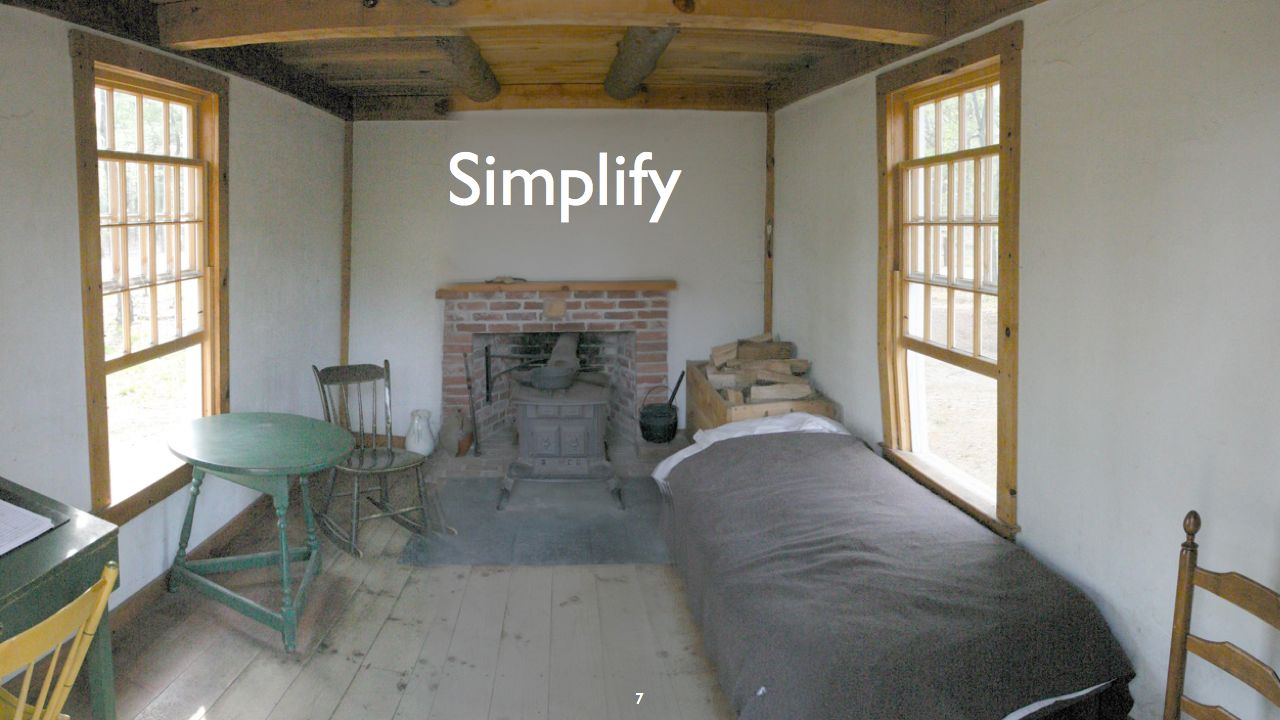 |
I like to paraphrase it as: “Simplify”. You can see here a facsimile of the cabin Thoreau built for himself. I don't have to sell this audience on the virtues of simplicity. Over the last few years, it's been a pleasure to see simplicity in design take over. But Thoreau was concerned with a different kind of simplicity. He was obsessed with how complexity can creep into unexpected corners of your life, disguised as necessity. He gives the example of a farmer who convinces himself he must eat meat in order to stay strong. Since meat is expensive, the farmer tills more land in order to afford it. And the harder he works, the hungrier he gets, in a vicious spiral. Meanwhile, the ox that pulls his plow makes do with a vegetable diet, and is stronger than the farmer will ever be. I had an interesting run-in with this pattern three years ago. I was leaning over a mop bucket when I saw my telephone come tumbling out of my shirt pocket, in slow motion. Even in 2013, water for some reason is still Kryptonite to electronics, and so of course it died on contact. Out of a mixture of curiosity (20%) and laziness (80%) I elected not to replace the phone, and see what would happen. I was pleasantly surprised to discover that I could live without it. However, it made it impossible for me to get any kind of notification if something happened to Pinboard. After worrying about that for a bit, I realized that I was better off not being wakened in the middle of the night if my site was sick. My users probably didn't want me typing into a root console in sleep-deprived panic. Things could wait until morning. So that made life a little less stressful. And then I noticed a follow-on effect. Just knowing that there was nothing that could possibly wake me up in an emergency was making me sleep better. So what I had thought was a convenience had actually been the foundation for a little pyramid of anxieties. It made me wonder what other stuff in my life was behaving that way. But again — I was too lazy to investigate further. I'm not arguing, necessarily, that you all should give up your cell phones. But I'm intrigued by this idea of complexity being something adversarial, that sneaks into your life, like a cockroach, and you have to fight to eradicate. |
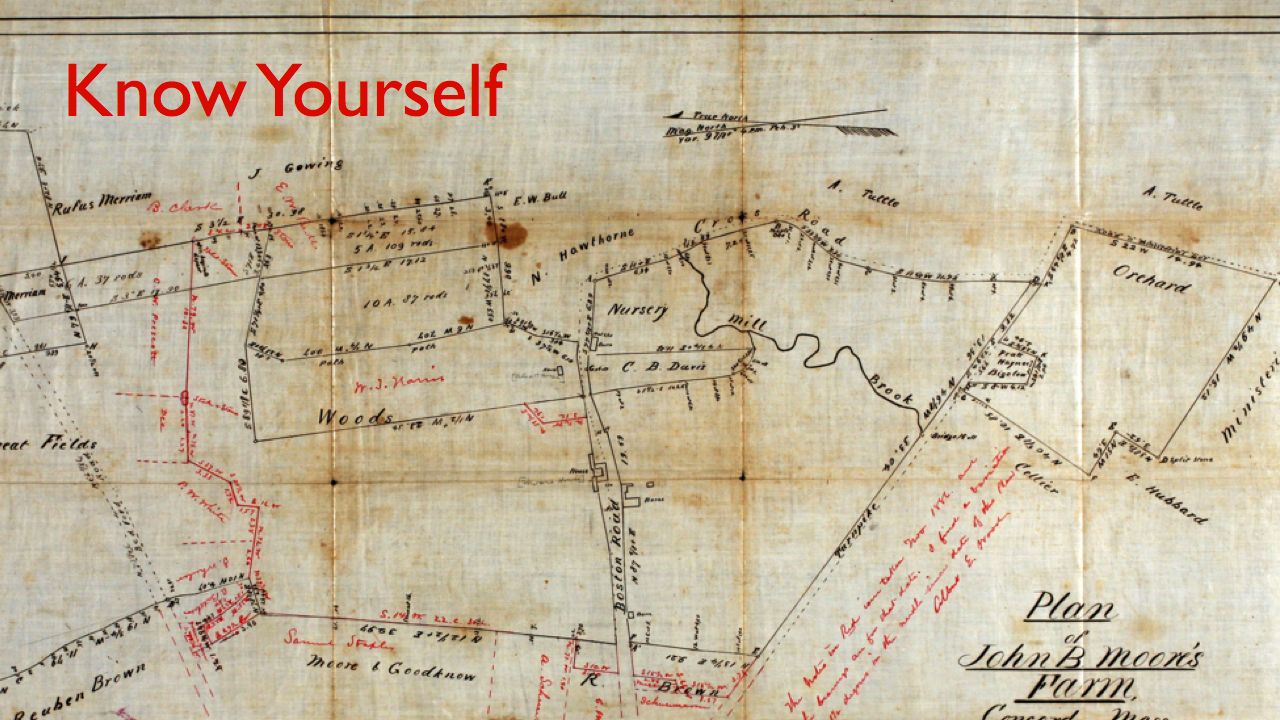 |
Thoreau's great problem was that he was a nature writer and an ecologist working at a time before either of those categories made any sense, partly because he was helping to invent them. To his friends and fellow writers, Thoreau was a disappointment, a talented writer who had chosen to squander his gifts picking huckleberries. Towards the end of his life, Thoreau actually got very systematic in the data he collected; he may have known more than any man alive about the ecology of New England. But this meant nothing to anyone but him. Nor was it obvious that his nature writing was on a par with the more 'literary' efforts of his time. I mention this because all of us in this room are very lucky to be present at the birth of a new medium. It may not feel new, but it really is early days. We get to define what kind of things it will possible to "be" online. That's an enormous privilege. But it comes with a price, a kind of centrifugal force you can feel tugging at your identity, pulling you towards other roles that already exist. It can be uncomfortable not to have a name for the thing you do. You have to make sure you plant your feet, and take care to pick the right spot to stand on. |
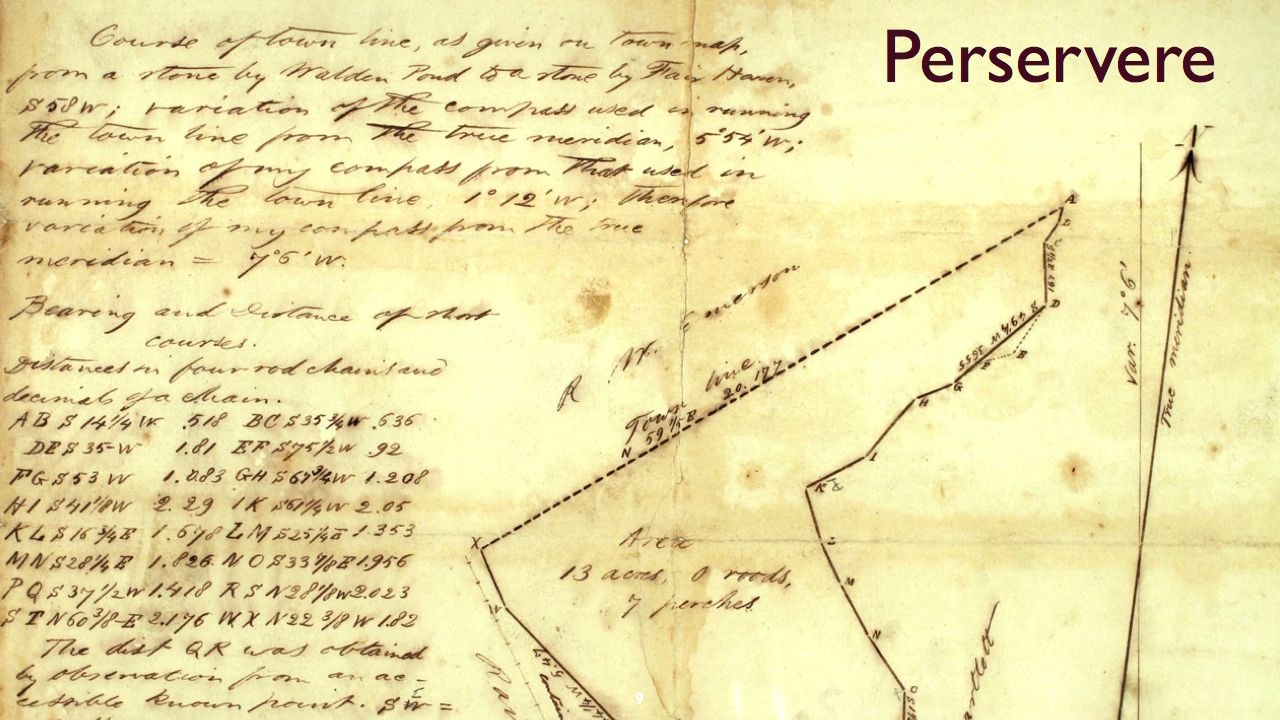 |
Thoreau's first book was a failure. He had it published himself, and at some point his publisher made him come down and fetch the rest of the print run, which was taking up too much space. Thoreau hauled it up to Concord, and told a friend at the time: I have now a library of nearly 900 volumes, over 700 of which I wrote myself. But this hurt! He had to go back to work at his father's pencil factory (if you've ever used a Conté crayon, you have Henry David Thoreau to thank, since he re-invented the process for making them). And when that didn't work, he had to pivot to farm labor, and finally surveying. Surveying, at least, let him work outside and in the woods, but he was often working for people who wanted to cut down the forest he spent all his free time in. There's a pernicious idea that comes out of startup culture called "fail fast". I've always been a big believer in failing slowly. When you're not in it for the money, success doesn't come to you pre-labeled. It can look just like failure. Chasing money makes it easier, because then you can quantify success unambiguously. Otherwise, you may have a hard time telling the two apart. You can work on a lot of projects, but you will only get a couple of opportunities to work on something long-term. So I would say pick those carefully, do things that are intrinsically rewarding, and be very loath to abandon them. And work that day job if you have to! |
 |
The best piece of advice Thoreau ever got was from Emerson, who told him to keep a journal. And Thoreau did, for decades, using it as a personal diary, a record of his botanical and scientific observations, and a kind of staging ground for his serious writing. He would go back and mine it years later for passages to use in his work. I don't think everyone needs to keep a literary journal, but I think it's vital to keep a work diary, for three reasons: First, because it's the only honest record of what you're thinking at the time. Your memory will lie to you, almost immediately, about what you thought was going to happen on any given day. The only way you can trust it is to write down your state of mind - what you're worried about, what you expect will happen. And then over time you can go back and look for patterns of thought that you might want to fix. Maybe you're always too optimistic, or maybe you choose to work with toxic people, or chronically underestimate what things will cost. Writing it down will help you understand your mental habits, and correct for them. Second, a work diary helps you track what you're actually doing. It's easy to get lost in the weeds from day to day, but are you ever spending time working on the things you think are most important? Thoreau was mistrustful of trivia the same way he mistrusted complexity, its capacity to take over our lives and push out what we value. An honest work record will tell you what you actually did, and what you spent your time thinking about. Finally, and most importantly, writing things down captures the details that you only glean from experience. The one thing separating me from the high-IQ theoreticians on a message board is the fact that I've actually been running a bookmarking site for four years. Experience is priceless, you can't get it except by doing it, so you want to be sure not to fritter any of it away, and document the details as they happen. They can come in useful later in the most surprising circumstances. |
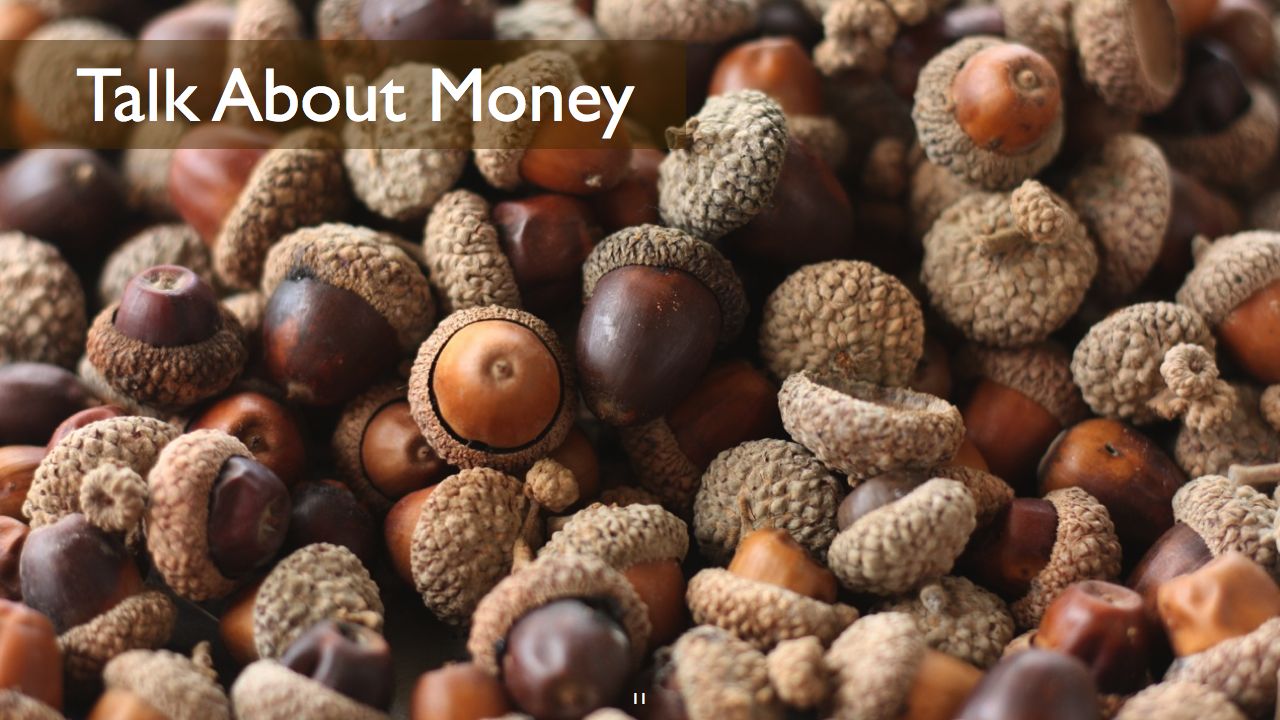 |
A charming thing about Walden is that Thoreau starts it straight away talking about money. He gives the full cost of building his house (around $24) and the total profit he got from cultivating his bean field, about eight bucks. If you're not motivated by money, it's easy to talk sometimes as if money is beneath you. But money is beneath us like the ground is beneath us; if it disappears, down we go. Only rich people have the luxury of not talking about money. As independent creators, trying to coax other people into striking out on their own, I think we have to take special care to be direct and honest about the financial aspects of our work. In working on Pinboard, I've benefitted from other projects that publish their expenses, especially in areas where these numbers would be really hard to estimate. And I've tried to do the same, sharing a spreadsheet with expenses for each year I've run the site. Sharing revenue, of course, is scarier. But I've discovered that the only people who really care are other people trying to start solo projects, and they find it helpful. So I'll go first - last year Pinboard earned $181,000. By my calculations, this makes me over 23,000 times as successful as Henry David Thoreau. |
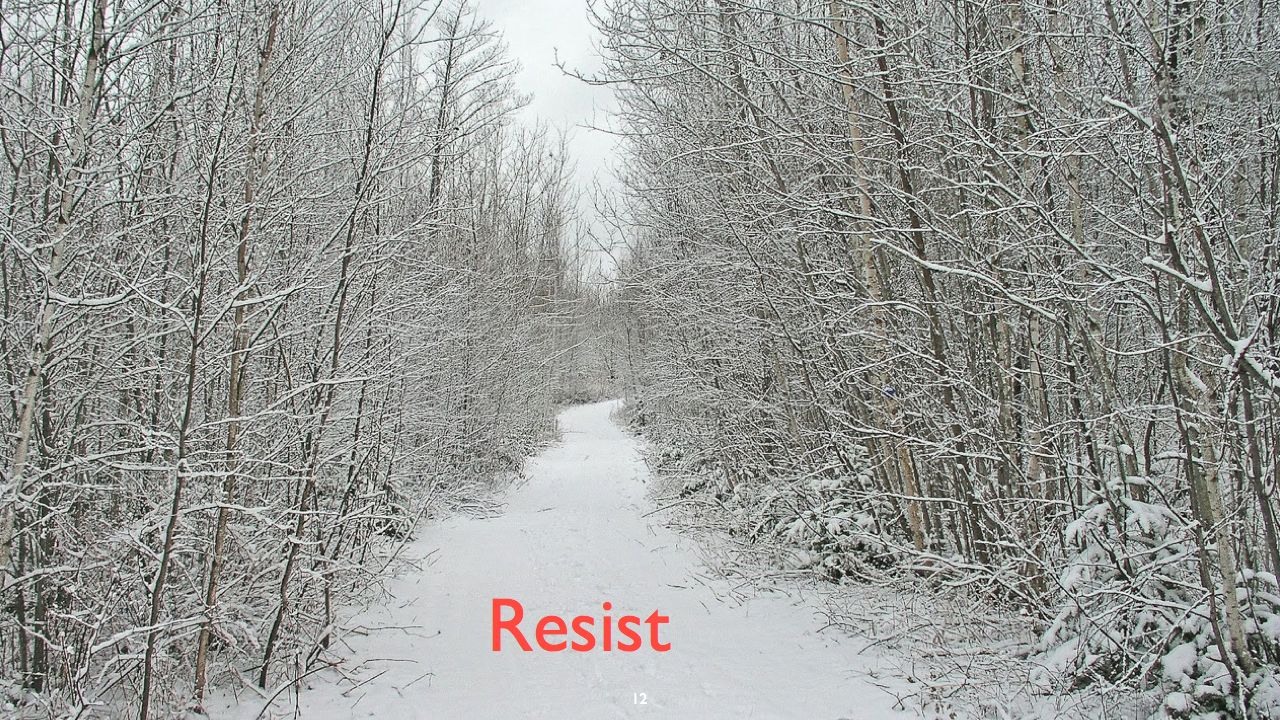 |
How does it become a man to behave toward the American government today? I answer, that he cannot without disgrace be associated with it. In 1846, Thoreau was thrown into jail for failing to pay his poll tax for six years. This was his protest against the Mexican War, which he saw as an attempt to extend slavery into the Western Territories. After leaving jail, Thoreau wrote an essay called “Resistance to Civil Government”, where he tried to reason out what we should do when the government compels us to do something morally wrong. It's not our job, Thoreau argues, to fix the world. We may not have the time for that. But we can't cooperate with injustice. If the law compels us to do something wrong, we have to break that law. This doctrine of non-cooperation with civil authority would have a powerful effect on Gandhi and Martin Luther King. Over the past few months, we've heard some shocking things about the extent to which our government is monitoring our online activity. To me more upsetting than the surveillance is the apparatus of secrecy that has been built around it, to make it impossible to observe, or honestly discuss, the full extent of what is going on. I've come to believe that it's time for us to take a stand, and refuse to cooperate with this apparatus of secrecy. We've already seen Lavabit, in an act of great moral courage, throw away ten years of hard work rather than acquiesce to blanket monitoring of its users. But the fact that Ladar Levinson wasn't even able to give the reasons for shutting his project down, that we had to infer them from his silence, demonstrates the problem. If anyone is going to refuse to cooperate, it is going to be small independent projects, not large corporations. "The rich man—not to make any invidious comparison—is always sold to the institution which makes him rich". Larry Page is not going to go to jail. Marissa Mayer is not going to jail - she's already said she thinks it's tantamount to treason! The large corporations - whose own business model, after all, is surveillance - have folded their hands and said "we've done everything we can within the law to fight this". But Thoreau argued, and I agree, that there is a higher law. The reason I think it's vital we act now is that this state of affairs is still shocking, still disturbing. Let it persist and it will become the new normal (in other words, the "old shitty") and anyone trying to fight it is going to be branded a Utopian or hopelessly naive, unable to come to terms with modernity. We should commit to giving legal, financial and moral support to anyone who refuses to obey gag order, or publishes a National Security Letter. The secrecy exists because the programs it cloaks can't withstand the light of day. One good, timely push will break them. Whether or not you agree with me, I would urge you to read Thoreau's essay, and decide for yourself: where do you draw the line? What will it take to make you stop cooperating? |
 |
You could make a cynical case that Thoreau was a bit of a phony. He conducted his experiment in self-reliance on land lent to him by a friend, limited his stay to two years, and received a stream of visitors the entire time. On Sundays, his mom and sister would come out with a basket of doughnuts and pies, which Thoreau devoured, presumably while they washed his socks and made his bed. Even his famous moral stand against the poll tax came after just one night in jail. Under cover of darkness, someone (probably his aunt) came by and paid the tax bill, and then paid it every year from then on. So Thoreau had all these people, mostly women, who silently enabled the life he thought he was heroically living for himself. But a gentler, more generous way to look at it is this. If you live a life by your own lights, and follow your principles, maybe once in a while someone will come and bring you a basket of donuts. And it's okay to eat the donuts! They're delicious! Thoreau said about his two years at Walden: I learned this, at least, by my experiment; that if one advances confidently in the direction of his dreams, and endeavors to live the life which he has imagined, he will meet with a success unexpected in common hours. Thoreau wrote this never having tasted any of traditional forms of success. He was thinking of a different, more fundamental kind of success, one that I wish for myself, and earnestly wish for all of you. But the greatest lesson, the one thing you should retain from reading Thoreau even if you forget everything else, is this: |
 |
Go outside. It's a beautiful day, it's lunchtime, and Portland is a beautiful city! THUNDEROUS, PROLONGED APPLAUSE
|